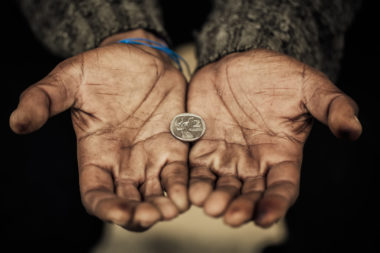Table of Contents
What is Panhandling?
In general, panhandling is when a person stays in a public place and asks for (free) money from others. Other names for panhandling including begging, asking for money, soliciting for cash, and more. Panhandling though is different from street performers, or buskers, who are trying to earn money by entertaining in public spaces. Many view panhandling as a form of loitering, but often staying in public places for long periods of time, during daylight hours, doesn’t qualify.
Aggressive Panhandling
There are two legally distinct types of panhandling: passive and aggressive. Passive panhandling is done with signs or buckets, with typically no words exchanged in the solicitation for money or contributions. Aggressive panhandling is when a person vocally asks for money, threatens, follows a person, pesters, or gets too close to an individual. Every state and city has their own laws that define aggressive panhandling.
Is Panhandling Illegal? Panhandling Laws and Enforcement Issues
In general, across the United States, passive panhandling is legal. In the 1990s, the Supreme Court struck down several state panhandling laws, stating that panhandling falls under freedom of speech. That means people can hold signs or a donation container in public places.
Aggressive panhandling is illegal, though what is defined as “aggressive” depends on state and local laws. Laws and ordinances can restrict panhandlers from speaking to pedestrians, which hours they can be out and panhandling, how close they can get to a pedestrian, how far away they have to be from entryways to buildings, proximity to banks or ATMs, or proximity to transportation areas like bus stops or airports
Panhandling Laws By State and City
A few states have panhandling laws, such as Indiana, but most places leave it up to city and local governments to create and enforce such laws. Panhandling laws are typically done as a proxy meant to control the homeless population in their area.
Panhandling laws are typically hard to enforce, for a variety of reasons. For one thing, it’s hard to prove a person was aggressively panhandling after the fact. Additionally, homeless people can be hard to track down to serve fines and court summons to, and often can’t pay any fines from breaking the law. The most police can usually do is force the panhandler to move when caught breaking the law or apparently harassing pedestrians.
Solicitation and Freedom of Speech
In general, solicitation of money in public areas is covered by a person’s freedom of speech. Charities, private groups, non-profits, and more routinely solicit money in public. Santas ringing bells outside stores during the holidays, to raise money for the Salvation Army, are doing a very similar thing—and they generally aren’t being persecuted for panhandling.
Many panhandling laws have to be very specific in order to avoid violating a person’s freedom of speech. A large amount of laws and ordinances get struck down by state and national courts for breaking the first amendment. When enforcement, or even word of panhandling laws target specific groups, like the homeless, it becomes too selective to withstand a legal challenge. The trouble is, those being targeted by selective enforcement don’t always have the resources to mount a legal defence or to challenge panhandling laws.
How to Deal With Panhandlers
Generally, giving money to panhandlers is discouraged. There are already resources in most towns and cities to help out homeless people, including government, non-profit, and religious organizations. These organizations exist to magnify the impact of individual donations, and to directly serve the needs and challenges of vulnerable groups. While it can be hard in some cases to refuse to give to someone who confronts you on the street, very rarely would your money be used to maximum positive effect.
You may want to consider donating that money to local organizations instead of directly to the individuals in need. That could include money donations, or donating to their needs, including food, clothes, and sanitary items. Similarly, if you find yourself routinely or frequently confronted by panhandlers, you could provide them literature directing them to nearby resources, or provide them with alternative donations like food, water, or clothing.
When confronted with panhandlers, the best approach is to either ignore them or point them in the direction of the nearest homeless assistance organization. If a panhandler becomes aggressive or intimidating, report them to your local police.
Image Source: https://depositphotos.com/





